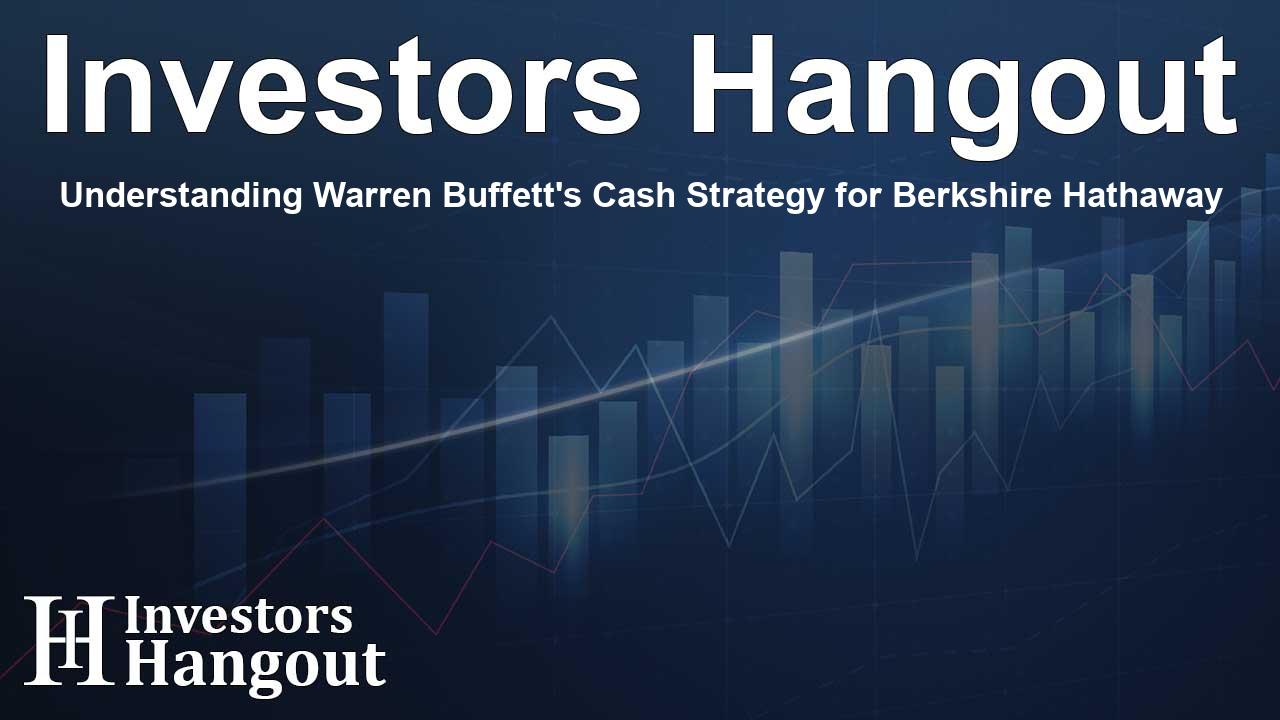Understanding Warren Buffett's Cash Strategy for Berkshire Hathaway

Warren Buffett's Investment Philosophy in Today’s Market
Investors often aim to glean insights from prominent market figures, especially as they navigate fluctuating economic landscapes. In this analysis, we turn our focus to Warren Buffett, famously known as the Oracle of Omaha, who is currently adopting a cautious stance in the bull market.
Buffett's investment approach emphasizes value, particularly illustrated through the cash reserves held by his conglomerate, Berkshire Hathaway (NYSE: BRKb). Typically, Berkshire’s cash levels ebb and flow based on market conditions, with higher cash allocations when compelling opportunities are scarce.
Buffett's Cash Reserves: Historical Context
Historically, Buffett's cash reserves indicate his perspective on market valuations. For instance, in a significant interview in 1999, he expressed reluctance to invest due to what he termed "obscene valuations." Critics scrutinized him for seemingly missing the dot-com bubble, but investors saw the wisdom in his caution as he later capitalized on opportunities during market corrections.
Fast forward to today, and Buffett's positioning seems eerily similar. The Buffett indicator, which compares stock market value with U.S. GDP, reveals that the market is currently at historically high valuation levels. Buffett's strategy of holding cash during such times reflects his long-term value-driven investing style.
As of now, Berkshire boasts an impressive cash reserve exceeding $325 billion, marking a significant increase from previous years. This amount now constitutes approximately 25% of Berkshire's total assets, notably higher than the average range of 14% to 16%. This substantial cash allocation underscores Buffett's cautious approach in the context of elevated corporate earnings, which represent over 12% of GDP.
The Current Market Outlook: A Cautious Approach
Buffett's insights imply a belief that the market may experience stagnation akin to past trends. Furthermore, his reluctance to invest highlights a perceived lack of attractive purchasing options beyond bonds. Presently, Buffett holds more capital in bonds than even the Federal Reserve, indicating his anticipation of a protracted period of subdued equity activity.
This cautious strategy aligns with recent projections from financial institutions, such as the insights from Goldman Sachs, which identifies downside risks in the S&P and suggests that bonds and oil may serve as protective investments in the face of potential market volatility.
Moreover, Buffett's increased investment in energy companies, particularly his significant stake in Occidental Petroleum (NYSE: OXY), reflects a strategic pivot toward sectors that may yield more stable returns amidst current market uncertainties.
Implications for Individual Investors
While Buffett's substantial cash reserves paint a picture of restraint, individual investors should remain engaged with the market. Buffett's unique situation arises from his extensive capital, allowing him to maintain flexibility that may not be available to smaller investors. This fact invites a proactive approach for individuals seeking growth amidst the prevailing caution.
It is essential for investors to identify emerging opportunities in the market that may not be feasible for Buffett to tackle due to size limitations. By maintaining a vigilant stance and exploring alternative investment avenues, investors could potentially capitalize on trends that arise in 2025 and beyond.
Frequently Asked Questions
Why is Warren Buffett holding onto a large cash reserve?
Warren Buffett holds significant cash reserves as a strategic move during periods of elevated market valuations and limited attractive investment opportunities.
What does a high cash reserve indicate for Berkshire Hathaway?
A high cash reserve reflects Berkshire Hathaway's caution in investing, signaling a lack of opportunities that meet Buffett's value-based investment criteria.
How should individual investors approach the market today?
Individual investors should remain active and explore investment opportunities, as the current market dynamics may provide unique chances for growth.
What is the significance of the Buffett indicator?
The Buffett indicator compares market capitalization to GDP, offering insights into market valuation levels which influence investment decisions.
How does Buffett's investment in bonds influence his strategy?
Buffett's prominent position in bonds signifies his expectation of prolonged market stagnation and serves as a hedge against equity market volatility.
About Investors Hangout
Investors Hangout is a leading online stock forum for financial discussion and learning, offering a wide range of free tools and resources. It draws in traders of all levels, who exchange market knowledge, investigate trading tactics, and keep an eye on industry developments in real time. Featuring financial articles, stock message boards, quotes, charts, company profiles, and live news updates. Through cooperative learning and a wealth of informational resources, it helps users from novices creating their first portfolios to experts honing their techniques. Join Investors Hangout today: https://investorshangout.com/
Disclaimer: The content of this article is solely for general informational purposes only; it does not represent legal, financial, or investment advice. Investors Hangout does not offer financial advice; the author is not a licensed financial advisor. Consult a qualified advisor before making any financial or investment decisions based on this article. The author's interpretation of publicly available data shapes the opinions presented here; as a result, they should not be taken as advice to purchase, sell, or hold any securities mentioned or any other investments. The author does not guarantee the accuracy, completeness, or timeliness of any material, providing it "as is." Information and market conditions may change; past performance is not indicative of future outcomes. If any of the material offered here is inaccurate, please contact us for corrections.